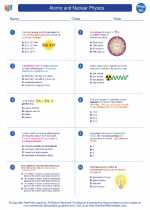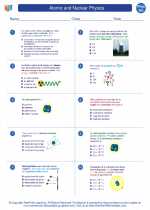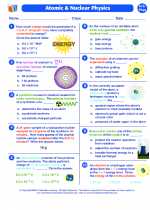Atomic and Nuclear Physics
Introduction
Atomic and nuclear physics is a branch of physics that deals with the structure, properties, and behavior of atoms and nuclei. This field encompasses the study of atomic structure, nuclear reactions, radioactivity, and nuclear energy.
Key Concepts
- Atomic Structure: The structure of an atom, including the arrangement of electrons, protons, and neutrons.
- Nuclear Reactions: Processes involving changes in the nucleus of an atom, such as fusion, fission, and radioactive decay.
- Radioactivity: The spontaneous emission of radiation from the decay of unstable atomic nuclei.
- Nuclear Energy: The energy released from nuclear reactions, which has applications in power generation and nuclear weapons.
Key Principles
- Quantum Mechanics: The theory that describes the behavior of particles at the atomic and subatomic levels.
- Electromagnetism: The study of the interaction between electrically charged particles and the forces they exert on each other.
- Nuclear Forces: The strong and weak forces that act within the nucleus of an atom, governing nuclear interactions.
Study Guide
To master the concepts of atomic and nuclear physics, here are some key topics to focus on:
- Understanding the structure of the atom, including the arrangement of electrons in energy levels and the role of the nucleus.
- Exploring the properties of different atomic models, such as the Bohr model and the quantum mechanical model.
- Learning about nuclear reactions, including the processes of fusion and fission, and their applications in energy production.
- Studying the phenomenon of radioactivity, the types of radioactive decay, and the associated health and environmental implications.
- Investigating the principles of nuclear energy, its advantages and disadvantages, and its role in the global energy landscape.
Additionally, practicing problem-solving exercises and conducting experiments related to atomic and nuclear physics can enhance your understanding of the subject.
By mastering these concepts and principles, you will develop a strong foundation in atomic and nuclear physics that can be applied to various scientific and technological fields.
.◂Physics Worksheets and Study Guides High School. Atomic and Nuclear Physics
Worksheet/Answer key Atomic and Nuclear Physics
Atomic and Nuclear Physics  Worksheet/Answer key
Worksheet/Answer key Atomic and Nuclear Physics
Atomic and Nuclear Physics  Worksheet/Answer key
Worksheet/Answer key Atomic and Nuclear Physics
Atomic and Nuclear Physics  Worksheet/Answer key
Worksheet/Answer key Atomic and Nuclear Physics
Atomic and Nuclear Physics 

 Worksheet/Answer key
Worksheet/Answer key
 Worksheet/Answer key
Worksheet/Answer key
 Worksheet/Answer key
Worksheet/Answer key

The resources above cover the following skills:
PHYSICAL SCIENCE
Matter and Its Interactions
Develop models to illustrate the concept of half-life for radioactive decay.
Research and communicate information about types of naturally occurring radiation and their properties.